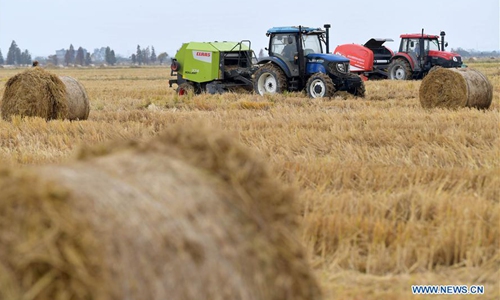Chinese officials say grain supplies are sufficient following coronavirus-triggered export suspension

Workers of a wheat straw recycling company pack up collected wheat straw in the field in Jiangxiang Town of Nanchang County, Nanchang, east China's Jiangxi Province, Nov. 29, 2019. (Xinhua/Peng Zhaozhi)
Two Chinese government officials said at a press conference on Thursday that China's grain supply is sufficient to meet domestic demand, setting people's minds at ease at a time when a number of countries have been restricting grain exports amid the coronavirus epidemic.
"Chinese consumers don't need to worry about a grain supply shortage or price surge, nor do they need to stock grain at home," said Wang Bin, a government official at the Ministry of Commerce (MOFCOM), on Thursday.
According to Wang, China had 280 million tons of wheat, maize and rice in stock by 2019, which can "totally meet domestic demand."
Currently, China's grain imports account for about 2 percent of China's total production and consumption, said Liu Changyu, also a MOFCOM government official, during the press conference.
Chinese government officials are reassuring the public about grain supply to stem a mood of panic after a number of countries banned grain exports, including Vietnam which banned rice exports and Serbia which shut the door on exports of sunflower seed oil.
Ma Wenfeng, an agricultural expert, said that China mostly imports rice from Vietnam, while importing wheat from the US, Canada and Australia.
"With the large amount of production at home, demand for grain imports is not rigid, and I believe imports will be back to normal soon because the coronavirus impact will just be temporary," he told the Global Times.
He also noted that China's wheat production might hit a record high this year if there are no natural disasters.